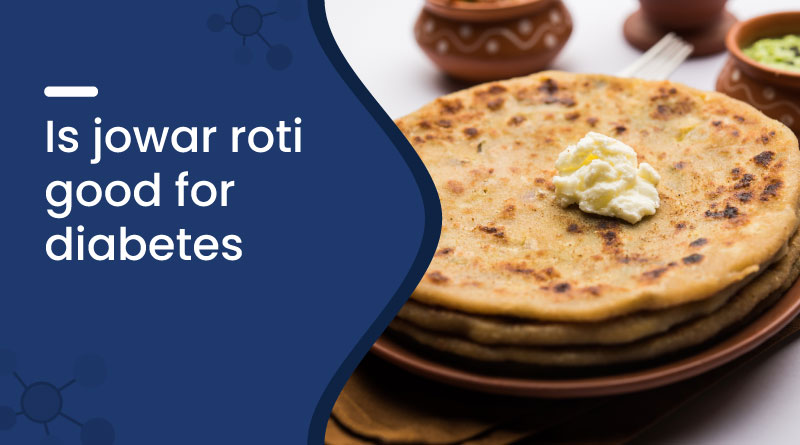Is Jowar Roti Good for Diabetes?


Diabetes is a chronic disease that requires careful dietary planning. Out of all the precautions and measures to tackle diabetes, choosing the right type of carbohydrate is the most important one. White rice or wheat flour can cause a sudden increase in blood sugar, which makes them less ideal. Lately, jowar roti has become popular as a healthy option for people with diabetes. Let us know how Jowar roti is good for diabetes.
What Is Jowar?
Jowar, also known as sorghum, is a whole grain that has been consumed in India for centuries. Traditionally used in the form of jowar roti, this gluten-free millet is now making a comeback due to its impressive nutritional value and health benefits.
Nutritional Value of Jowar
Jowar’s high fiber and complex carbohydrate content make it ideal for maintaining balanced blood sugar. Here is the approximate nutritional breakdown of 100 grams of jowar flour:
| Nutrient | Amount (per 100g) |
|---|---|
| Calories | 329 kcal |
| Carbohydrates | 72.6 g |
| Protein | 10.4 g |
| Fiber | 9.7 g |
| Fat | 3.1 g |
| Calcium | 25 mg |
| Iron | 4.1 mg |
| Magnesium | 165 mg |
| Phosphorus | 289 mg |
How Is Jowar Roti Good for Diabetics?
- Low Glycemic Index (GI): Jowar has a low glycemic index, which means it causes a slower rise in blood glucose compared to high-GI foods like refined flour or white bread. This makes it suitable for people managing Type 2 diabetes.
- Rich in Dietary Fiber: High fiber content helps in slowing down digestion and glucose absorption. This prevents blood sugar levels from rising suddenly after meals.
- Packed with Plant-Based Protein: The protein in jowar contributes to satiety and reduces post-meal hunger, which is essential for blood sugar regulation and weight management.
- Gluten-Free Alternative: For those with both diabetes and gluten intolerance, jowar roti is a perfect substitute. It’s naturally gluten-free and easy to digest.
- Good Source of Antioxidants: Jowar contains polyphenols, which act as antioxidants, helping to reduce oxidative stress—a factor that plays a role in the development of diabetes-related complications.
Also Read - Ayurvedic Medicines for Diabetes
Jowar vs. Wheat: Which Is Better for Diabetics?
Both jowar and whole wheat are popular staples in Indian households, but when it comes to managing diabetes, jowar has a slight edge. Jowar has a lower glycemic index (GI) compared to wheat, which means it leads to a slower and more controlled rise in blood sugar levels. This is especially important for people with diabetes, as it helps avoid sudden spikes after meals.
Another major difference is that jowar is naturally gluten-free, making it easier to digest and a better option for individuals with gluten intolerance or sensitivity.
How to Include Jowar Roti in a Diabetic Diet?
- Serve jowar roti alongside high-fiber vegetables like okra (bhindi), spinach, or lauki.
- Avoid adding too much oil or ghee while cooking.
- Manage your portions—have 1 to 2 rotis per meal, depending on how many calories you need.
- Balance your plate with a good source of protein like lentils or tofu.
Supplement for Diabetes
| Product Name | Use |
|---|---|
| Zeelab Berberine Gold Capsule | Helps control blood sugar levels, improve insulin sensitivity, and support metabolic health in people with diabetes. |
Conclusion
Choosing jowar roti is a diabetes-friendly option that supports better health. Its low glycemic index, high fiber content, and rich nutrient profile make it ideal for maintaining blood sugar levels and supporting overall metabolic health. As with all foods, balance and portion control are important. For best results, it should be part of a balanced and varied diet customized to individual needs.
If you're managing diabetes, consider switching your regular roti with jowar for a simple yet effective dietary upgrade.
Also Read - Sugar Control Medicine
Frequently Asked Questions (FAQs)
Q. Is Jowar flour healthy for people with diabetes?
A. Yes, jowar flour is a healthy choice for diabetic people as it has a low GI and does not increase the sugar level in the blood.
Q. Is Jowar better than Wheat for diabetic people?
A. Yes, Jowar is better because it has a lower glycemic index and is also naturally gluten-free.
Q. What are the benefits of Jowar roti?
A. Jowar has a high fiber content, which promotes healthy digestion, prevents constipation, and improves gut health.
Q. Can I eat Jowar roti daily?
A. Yes, Jowar roti can be included in the daily diet as it is healthier and better than wheat flour roti.
Berberis aristata (500 mg)
30 capsules per jar
Recent Blogs
Disclaimer : Zeelab Pharmacy provides health information for knowledge only. Do not self-medicate. Always consult a qualified doctor before starting, stopping, or changing any medicine or treatment.
Related Products
Need Medicines Quick?
Share location to check quick delivery serviceability.
Change Location
Location Access Needed
Your location appears to be blocked or disabled.
Please enable the location from your browser or
device settings.

₹ 0
0
Items added
Quick Links
Categories
Our Policies
2026 Copyright By © Zeelab Pharmacy Private Limited. All Rights Reserved
Our Payment Partners

 Added!
Added!
|
|














